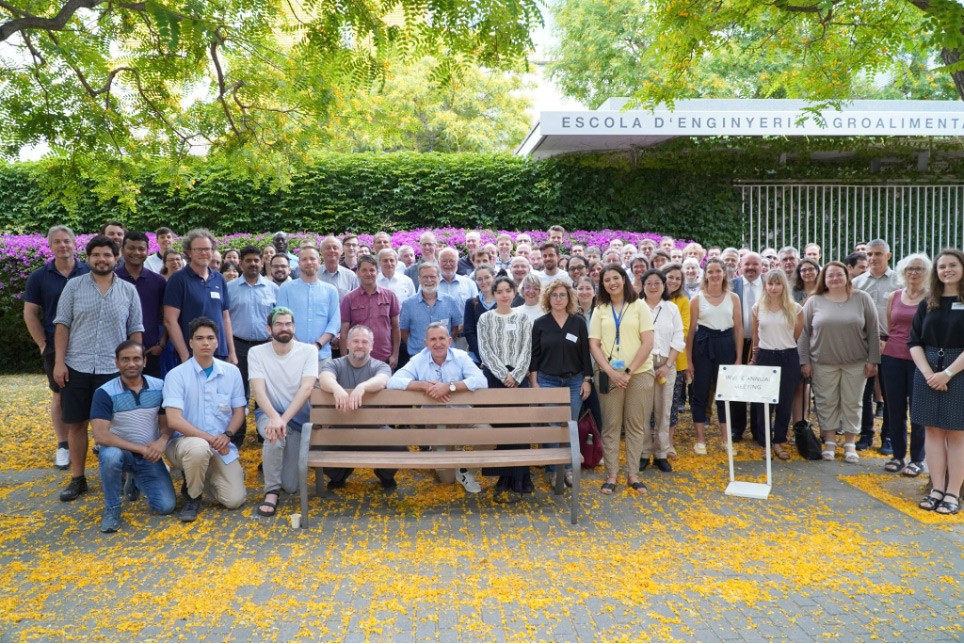INVITE annual meeting: data sharing and phenotyping
Publicatiedatum: 5 juli 2023
From 12 to 14 June, various organisations came together in Barcelona for the European project INVITE. More than 90 attendees from various institutions and organisations shared presentations of the studies and their conclusions and engaged in discussion. Naktuinbouw also took part.

The five-year project INVITE (Innovations in plant Variety Testing in Europe) started in 2019 and focuses on innovations in Plant Breeders' Rights and value for cultivation or use testing (VCU). The core of INVITE is to improve the security of the assessment, especially through the use of new technology. It is about the resistance of new varieties to stress. Both for diseases and pests and for stress due to challenging environment conditions such as heat and drought. The emphasis is on developing new measurement and analysis methods with sensors, models and artificial intelligence. One of the roles of Naktuinbouw is the use and implementation of DNA databases and image analysis, or phenotyping tools.
Work Packages
Nine so-called work packages have been named in the project. Among other things Naktuinbouw plays a part in database management from the various packages. The other themes we work on are the use and implementation of DUS, VCU and genotype databases (WP7) and image analysis or phenotyping (WP2).
Structuring DUS data
The main goals of WP7 are:
- Facilitate data interoperability and exchanges within the consortium
- To set up a prototype of a common database to store phenotypic and genotypic variety data and provide a user-friendly interface.
Since 2020 Naktuinbouw has provided a dropbox-like data sharing system in the form of Nextcloud. It even allows terabytes of data to be shared. The consortium exchanges variety data with each other via this platform. In addition, Naktuinbouw also hosts a 'gitlab code repository' to maintain the source code.
Due to COVID, there was delay in generating data within the project. But in the last one year significant data got generated and needed a place to be stored. So, Naktuinbouw started working on the database proactively.
During the annual meeting, Shivendra Dayal from Naktuinbouw, co-leader of WP7 and developer of the database released the first version of the database in which all kinds of DUS, VCU and genotype data can be stored. During the presentation itself, people were able to explore the features of databases live themselves. All properties of ryegrass are stored in the database. This database can be used to view the variation of ryegrass properties over the years. It has separate sections tot manage data and view data. There are also plans to add DUS / VCU data for tomato, maize and potato to the database. There was also a survey conducted to understand for which crops the consortium was interested in storing data. The database architecture generated lot of interest in the consortium and even the countries outside Europe working in projects like INVITE wanted to collaborate further on it.
Michel Ebskamp and Bert Scholte from Naktuinbouw shared their knowledge and provided awesome insights in discussions around DUS and VCU. Follow up appointments have been made with different experts to discuss the state of play in the crops for which Naktuinbouw had provided input: tomato, perennial rye grass and potato. In addition, WUR experts will visit the DUS trials in grasses and potato in Tollebeek to address possibilities for the remaining 1.5 years of the project.
Image analysis and phenotyping
WP2 is about the setting up of a fast, cheap method to assess a number of external characteristics using vision techniques.
During the work package 2 meeting, the participants had the opportunity to try out the tomato phenotyping app. WUR had developed this app and Naktuinbouw was its first client. The users downloaded the 500 MB app on the Android phones and ran real-time tests.
Participants
Organisations from nine countries are participating. For the Netherlands: Naktuinbouw, NAK and WUR. Representatives from around 50 different institutes attended -- AFBI, Arcadia International, CREA, IRTA/CRAG, The University of Queensland, Better3fruit, Inrae, ARVALIS, Acta , Agri-Food and Biosciences Institute, University of Angers/INRAE, Euroseeds , NIAB , CTIFL, CPVO, NEBIH, Hungary, University of Hohenheim, Naktuinbouw, WUR, GEVES, AGES, Center for Research in Agricultural Genomics (CRAG), Agroscope, Research Center Laimburg, Technical University of Madrid, INRAE-ISHS, The National Institute of Horticultural Research, Arcadia, ILVO, Bundessortenamt / Federal Plant Variety Office, National Food Chain Safety Office, Hungary, AGES - Austrian Agency for Health and Food Safety, Research Institute for Organic Agriculture FiBL, ÚKZÚZ, Teagasc, BioSS, INRAE-LEPSE, CSIC, SASA , CREDA-UPC-IRTA, CRA-W, CONSULAI.
Want to know more about INVITE?
Sign up for the INVITE newsletter to stay informed.
